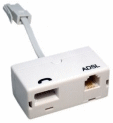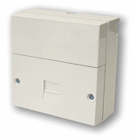
Current Solutions
Thankfully there are some things that residents of isolated communities can explore. We have listed the primary solutions below, including any potential drawbacks . Please note that this information is only designed to serve as a rough guide. Continue to read after this in order to find out more about what might happen in the near future to help such locations.
1. Existing Fixed Telephone Line (Standard Broadband)
Many remote locations can usually still receive a very basic broadband service using ADSL or ADSL2+ technology (currently the most common UK methods), with speeds ranging upwards from around 0.5Mbps (512Kbps). Sadly the performance of ADSL services at these extreme reaches of your exchange are often far too slow and or unreliable for enjoyable use of modern rich media internet content (e.g. YouTube or BBC iPlayer viewing). An easy way to find out what's available on your line is to run a quick Broadband Coverage Check.
The good news is that you can often improve the stability and speed of some connections, even if only slightly, by making a few adjustments to your local home phone wiring and checking that the basics are all correctly covered. Here are some ideas to get you started (primarily applicable for those who have a slow broadband connection).
A. Mark sure ALL your phone extensions have a Microfilter (Splitter) attached.
 Common broadband (ADSL) connections require you to install a Microfilter device on EVERY phone socket in your home, not just the one where you plug your modem or router into the wall. These devices, which split the line into analogue (voice) and digital (broadband) work by separating the different frequencies and preventing interference that would otherwise cause noise/crackling on the line.
Common broadband (ADSL) connections require you to install a Microfilter device on EVERY phone socket in your home, not just the one where you plug your modem or router into the wall. These devices, which split the line into analogue (voice) and digital (broadband) work by separating the different frequencies and preventing interference that would otherwise cause noise/crackling on the line.
Failing to put one on all your phone sockets can cause a detriment to broadband speed; it's very easy to miss some phone outputs/sockets that might be hidden in the garage or behind a seat. We also recommend doing the same with any 2nd phone lines, even if ADSL is not present, just to be sure.
B. Plug the Router/Modem into your master socket.
 Generally speaking, the master telephone socket/linebox (e.g. BT NTE5) in your home is the one with two screws on the front that can be removed to un-clip the frontal faceplate. In some homes it can be difficult to identify the master socket as your phone box/sockets may look identical, especially if you've had more than one phone line installed.
Generally speaking, the master telephone socket/linebox (e.g. BT NTE5) in your home is the one with two screws on the front that can be removed to un-clip the frontal faceplate. In some homes it can be difficult to identify the master socket as your phone box/sockets may look identical, especially if you've had more than one phone line installed.
The master socket is usually the first output for your phone line and as a result it is also the one that will suffer the least interference from additional extension wiring/connections. To get the best broadband speed you should ideally be using this phone socket as any others will result in more interference and thus degraded speed, often significantly.
C. Keep electrical devices away from your router/modem and phone socket.
Ideally you should be keeping your master phone socket and router/modem away from as many other electrical devices as possible in order to avoid any excess electrical interference impacting your broadband. Likewise the phone cord between your Microfilter and router/modem should be as short as possible to avoid signal degradation.
There have been some well documented cases where old style Christmas tree lights and dodgy AC adapters have caused interference that, in one unique case, affected the broadband performance of a whole street. This is rare but some devices are still more likely than others to cause problems (microwave ovens, cordless phones and blinking xmas lights).

 Common broadband (ADSL) connections require you to install a Microfilter device on EVERY phone socket in your home, not just the one where you plug your modem or router into the wall. These devices, which split the line into analogue (voice) and digital (broadband) work by separating the different frequencies and preventing interference that would otherwise cause noise/crackling on the line.
Common broadband (ADSL) connections require you to install a Microfilter device on EVERY phone socket in your home, not just the one where you plug your modem or router into the wall. These devices, which split the line into analogue (voice) and digital (broadband) work by separating the different frequencies and preventing interference that would otherwise cause noise/crackling on the line.  Generally speaking, the master telephone socket/linebox (e.g. BT NTE5) in your home is the one with two screws on the front that can be removed to un-clip the frontal faceplate. In some homes it can be difficult to identify the master socket as your phone box/sockets may look identical, especially if you've had more than one phone line installed.
Generally speaking, the master telephone socket/linebox (e.g. BT NTE5) in your home is the one with two screws on the front that can be removed to un-clip the frontal faceplate. In some homes it can be difficult to identify the master socket as your phone box/sockets may look identical, especially if you've had more than one phone line installed.